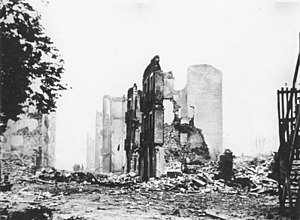Operation Ursula
| German involvement in the Spanish Civil War | |
|---|---|
| Part of the Spanish Civil War | |
 Guernica following the German and Italian bombing of the city in 1937. The Germans tried out many prototypes in Spain, and a variety of aerial tactics, from dive-bombing (in restricted and near-secret experiments) to large scale bombing of civilian populations. |
|
| Location |
Spain |
| Objective | Assist Nationalist forces |
| Date | 1936–39 |
| Executed by |
|
| Outcome | Successful operation:
|
German involvement in the Spanish Civil War commenced with the outbreak of war in July 1936, with Adolf Hitler immediately sending in powerful air and armored units to assist General Francisco Franco and his Nationalist forces. The Soviet Union sent in smaller forces to assist the Republican government, while Britain and France and two dozen other countries set up an embargo on any munitions or soldiers into Spain. Germany also signed the embargo but simply ignored it. The war provided combat experience with the latest technology for the German military. However, the intervention also posed the risk of escalating into a world war for which Hitler was not ready. He therefore limited his aid, and instead encouraged Mussolini to send in large Italian units. Franco's Nationalists were victorious; he became an informal ally of Germany, while remaining neutral in the Second World War. The Spanish episode lasted three years and was a smaller-scale prelude to the world war which broke out in 1939.
Nazi support for General Franco was motivated by several factors, including as a distraction from Hitler's central European strategy, and the creation of a Fascist Spain friendly to Germany to threaten France. It further provided an opportunity to train men and test equipment and tactics.
Hitler decided to support the Nationalists in July 1936. The German air force was used to carry the Army of Africa to Spain. A Spanish-German Spanish-Moroccan Transport Company (HISMA) and an entirely German company, the "Raw Materials and Good Purchasing Company" (ROWAK) were established. German transports moved nearly 2,500 troops from Spanish Morocco to Spain. Early intervention helped to ensure the Nationalists successes in the war's initial stages. The training they provided to the Nationalists proved as valuable, if not more so, than direct actions. From 29 July to 11 October the Germans transported 13,523 Moroccan troops and 270,100 kilograms of war material from Morocco to Andalusia; and it was Franco's African forces, thus transported and supplied, which were a decisive factor in the war. Germany signed the Non-Intervention Agreement on 24 August 1936, but consistently broke it. After a Republican air attack on the German warship Deutschland, Germany and Italy said they would withdraw from the Non-Intervention Committee and from maritime patrols. Early June 1937 saw the return of Germany and Italy to the committee and patrols, but they withdrew from patrols following a further attack. The German military in Spain, who were later reorganised and renamed the Condor Legion, claimed to have destroyed a total of 372 Republican planes and 60 Spanish Republican Navy ships. They lost 72 aircraft due to hostile action and another 160 to accidents. German aid to the Nationalists amounted to approximately £43,000,000 ($215,000,000) in 1939 prices.
...
Wikipedia
